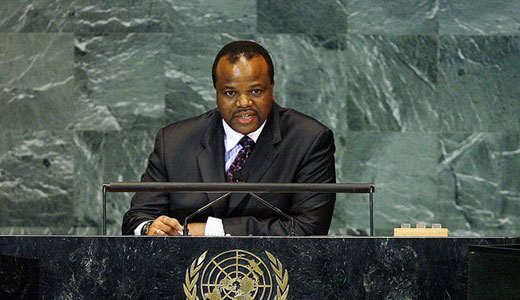
Tensions are rising in the small Southern African kingdom of Swaziland (population 1.2 million), as unionized teachers and public service workers face off against the security personnel of Africa’s last absolute monarchy. There are economic roots to the country’s problems that are similar to those of other African nations, but dissidents charge that the irresponsible attitude of the King, Mswati III is making the situation infinitely worse.
The Kingdom of Swaziland was created in the 19th Century by the Dlamini family, which sought to maintain independence by balancing off against each other dangerous neighbors: The Zulu Kingdom, the Boer South African Republic, and the British Empire. By the end of the 19th century, Swaziland became a British protectorate, whose fertile soil, mild climate and mineral resources attracted outside economic interests. South African and other foreign investment in Swaziland followed.
The “protectorate” jibed with the British colonial policy of “indirect rule,” in which far flung pieces of the empire were theoretically administered by local kings, princes, and maharajas. These rulers became buffers between London and the impoverished mass of colonial subjects. Swaziland got full independence in 1968, during the long reign of King Sobhuza II, the father of the present king. The trappings of a parliamentary democracy were soon abandoned by Sobhuza, who established a royal dictatorship that continues under Mswati III, who took full power in 1986.
Swaziland is overwhelmingly agrarian, and 75 percent of the population consists of subsistence farmers, while some work in the mines and other industries of neighboring South Africa. There is some mining (coal, gold, iron, and formerly asbestos) but by far the biggest industry in Swaziland is the cultivation and processing of sugar cane.
The Swaziland Sugar Association reports that sugar represents 59 percent of all agricultural output, 18 percent of Gross Domestic Product, 24 percent of manufacturing output, 35 percent of agricultural wages, 18 percent of manufacturing wages, seven percent of exports, and 58 percent of all Swazi exports to the European Union, which, after South Africa, is Swaziland’s main trading partner.
Sugar cultivation and processing are dominated by large-scale enterprises, mostly rooted outside the country, though the government has encouraged small farmers to experiment with it also. Big players in Swazi sugar include the CDC (originally the Colonial, later Commonwealth Development Corporation) owned by the British government, and the Swazi royal family.
Mining in Swaziland is in decline, increasing the importance of sugar. But now the appreciation in the value of Swazi currency has combined with changes in European Union agricultural trade policy to threaten income from sugar, which provides the tax revenues needed to pay the salaries of teachers and other civil servants. At the same time, food prices have been rising. To deal with this situation, King Mswati’s government has relied more and more on regional and international lending agencies. But in February the International Monetary Fund told the King that there would be no more loans unless austerity was applied to the national budget.
Basic services are falling apart. Schools are closing, and service workers wages drastically cut. Swaziland has the highest rate of HIV-AIDS in the world; a shocking 41 percent of adults are infected, but health facilities are closing.
Mswati has expensive tastes. As teachers and others have demonstrated for modest pay increases, the King has committed one tactless gaffe after another. He has purchased expensive luxury automobiles and accepted a gift of a private airplane from unknown sources. His thirteen wives are known for their lavish shopping habits, which can’t be satisfied in the capital, Mbabane, but require jet setting.
The king has demanded traditional forms of tribute from his subjects, including cows for his birthday. In spite of the emergency, the annual reed dance, in which tens of thousands of bare-breasted young women dance before the king in the hope that they are chosen as his next bride, will go ahead. And now three of his wives and their entourage are off to hit the slot machines in Las Vegas.
Opposition to Mswati’s royal despotism has been arising through the trade unions. Demands include increased wages and union rights, as well as democratic reforms. The Communist Party of Swaziland is calling for the end of the monarchy and the declaration of a democratic republic. Others call for a constitutional monarchy with limitation of the powers of the king and a democratic parliament to replace the present one in which royal influence prevails.
A month old teachers’ strike, has been met with a stone-wall of refusal to negotiate by the government, and increasing violence from the authorities. The government announced that any striker not back at work by Tuesday, July 24, would forfeit his or her job.
The teachers’ strike continues, now supported by nurses and taxi drivers. The strikers are calling on workers worldwide to show their solidarity. At writing, the King has left for South Africa. The Communist Party suspects a move to be away when harsh repression comes down, and has asked that the South African government place sanctions on the Swazi royal family.
Photo: Mswati III Marco Castro/Flickr












Comments